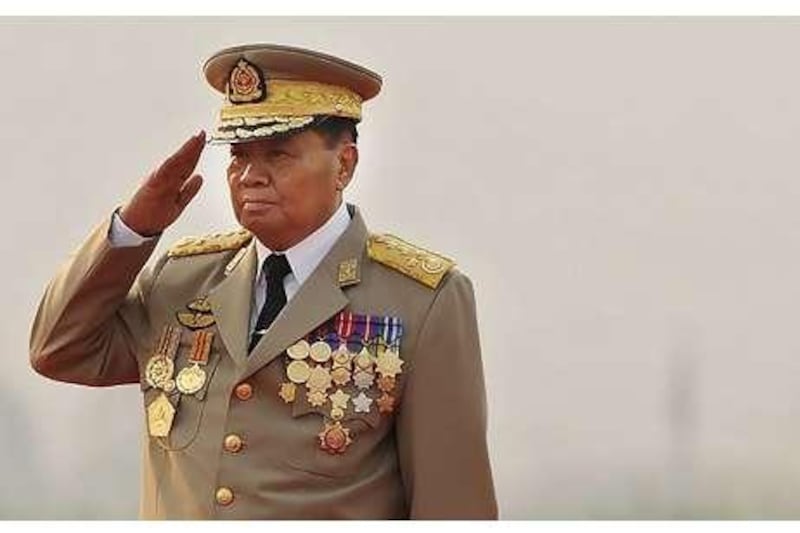MUMBAI // Dissidents and Myanmar exiles in India expressed outrage at the government's planned welcome for Myanmar's military ruler, Senior General Than Shwe, who arrives today on an official visit. Gen Than Shwe is expected to begin his five-day tour in Bodh Gaya, a renowned Buddhist pilgrimage site in the eastern state of Bihar. After that he is scheduled to fly to New Delhi to meet the Indian prime minister, Manmohan Singh. The two leaders were expected to sign a series of military and trade deals over two days.
Myanmar, an isolated country neighbouring India, is considered to be one of the most authoritarian regimes in the world. Last month, Foreign Policy magazine ranked Gen Than Shwe as the world's "third worst dictator" after Kim Jong-il of North Korea and Robert Mugabe of Zimbabwe. Gen Than Shwe's trip, widely speculated to be organised at the behest of India, has drawn heavy criticism from Myanmar exiles.
The Burma Centre Delhi, a non-profit organisation representing pro-democracy Myanmar activists and refugees living in India, wrote in a letter to Mr Singh last week: "Prime Minister Singh, as the leader of the biggest democracy in the world, you must take a lead in pressuring Than Shwe to uphold basic democratic principles that are so far being ignored in [Myanmar]. Your silence will [depict] your double standards."
India has long been an advocate of democracy to be restored in Myanmar, which has been under military rule since 1962. In 1993, India gave one of its highest civilian awards to Aung San Suu Kyi, the Myanmar opposition leader who has been under house arrest for 14 of the last 20 years. But in recent years, India has revealed its interest in cultivating close political, economic and military ties with Myanmar's junta, allowing its strategic priorities to override concerns about democracy and human rights.
Muan Kim, 33, the co-ordinator of Burma Centre Delhi, said the junta was notorious for human-rights abuses against its own population. There are currently 2,171 political prisoners locked up in Myanmar jails. The United Nations, which claims many of these detentions are illegal, has long been asking for their unconditional release. Mr Muan Kim said: "If India continues to engage with such a government, our people will never forgive the world's largest democracy for betraying the cause of democracy."
He said he was in the process of organising protests in Bodh Gaya. Even before Gen Than Shwe's arrival, the town was festooned with posters "telling Than Shwe to go to hell". Myanmar, which has not held elections since 1990, is expected to open polls later this year. But many countries are calling the exercise questionable, saying that it is expected to entrench the military's grip over power. Ms Suu Kyi's National League for Democracy is expected to boycott the polls.
"Than Shwe's trip is aimed at seeking India's endorsement of these elections," Mr Muan Kim said. The Indian government has not commented on the purpose of Gen Than Shwe's trip and has not responded to the criticism of Myanmar exiles. Hillary Clinton, the US secretary of state, expressed concerns on Friday about the growing military ties between Myanmar and North Korea. Myanmar is suspected of beginning a nuclear weapons programme with the help of Pyongyang.
Myanmar denies it is trying to build an atomic bomb. But analysts warn that its growing economic connections with growing powers such as India and China could soon give the isolated nation the ability to build one. Christian Le Mire, the editor of Jane's Intelligence Review, a London-based journal on military intelligence, said this month: "With Myanmar's current freedom from sanctions and relative economic prosperity, the junta may be able to outsource the technical know-how and tools to reach its goals far sooner than expected."
Jane's Intelligence Review also said that it accessed satellite images of an installation near Myanmar's capital, Naypyidaw, that it claims is part of its secret programme to build nuclear weapons. Myanmar's growing economic and military ties with China and India have rendered toothless sanctions imposed by EU and the US to put pressure on the junta. In 2007, India sparked cries of outrage from Amnesty International when it was reported that it planned to sell Myanmar an unknown number of advanced light helicopters made with components from at least six EU countries and the US, which breached an international arms embargo on Myanmar in place since 1988.
Last year, India's trade with Myanmar reached US$1.19 billion (Dh4.4bn), a 26 per cent increase over the previous year. On his trip to Hyderabad, Gen Than Shwe is expected to broker a deal with Tata motors, an Indian car-making giant, to set up an automobile factory in Myanmar. @Email:achopra@thenational.ae





